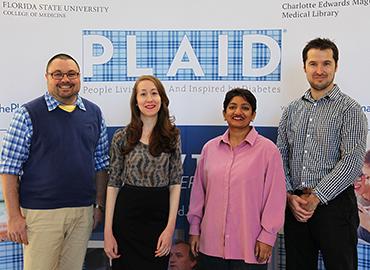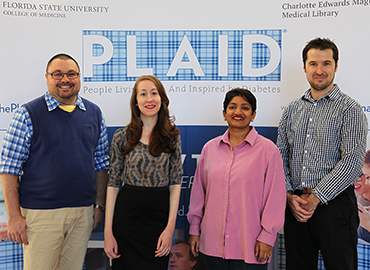PLAID Journal features diabetes research and practical tips


November 2014
Martin Wood is so open about his medical condition that he has “Diabetic” ornately tattooed on his right forearm. He believes scientific journals should be just as open with their information, not hide it behind exorbitant subscription costs.
No surprise, then, that as editor-in-chief of The PLAID Journal — the College of Medicine’s new, diabetes-focused publication — Wood insists that it be open-access.
“PLAID” stands for “People Living with And Inspired by Diabetes,” and the first edition is scheduled for this spring. On Nov. 14, World Diabetes Day, Wood put out the call for research submissions and peer reviewers.
“We’re reaching out beyond Florida State,” he said. “We’re looking for folks working with diabetes every day and those living with diabetes every day. We want to make sure this is done right.”
As director of the college’s Charlotte Edwards Maguire Medical Library, Wood knows journals inside out. As someone living with diabetes, he knows the disease inside out. And he knows exactly the niche that he wants PLAID to fill.
“A huge online collection of people blog about diabetes, share on forums and speak in public about it. I’m one of them,” said Wood, who writes the blog Diabetically Speaking. “We’ve been searching for a journal that would have this kind of information and back it up with research. I’ve talked to many professionals doing the research, but they have nowhere to publish it. Or their work is published where people who need to read it can’t. The subscription could be $3,000 a year.
“That’s why making The PLAID Journal open-access is so incredibly important. We want people to email the link to each other, share it on social networks, put it everywhere.”
PLAID’s editorial board comprises Students With Diabetes founder Nicole Johnson, who has a doctorate in public health and was Miss America; Joe Solowiejczyk, author of “A Type 1 Diabetes Guide to the Universe”; Korey Hood, Stanford University expert on psychosocial aspects of living with diabetes; former American Diabetes Association President Larry Deeb, who teaches FSU med students; and College of Medicine researchers Kimberly Driscoll and Gail Galasko.
Roxann Mouratidis, from the college’s medical library, is PLAID’s managing editor; Shenifa Taite, Office of Medical Education, is communications editor; and Mark Bauer, also OME, is design editor.
Wood said the journal has received unqualified support from College of Medicine administrators.
“One thing we’re focused on here is the treatment and management of chronic disease,” Dean John Fogarty said. “Diabetes, unfortunately, is a chronic disease that seems to be increasing in frequency. There’s a great need for a journal like PLAID.”
Readers will find not only the latest medical breakthroughs but also such practical information as how to travel with diabetes, how to talk about diabetes with others, and how health insurance policies affect diabetes decisions.
“What we want,” Wood said, “is for the patient to be able to say, ‘Doc, I found this in PLAID,’ and for the doctor to respond, ‘Great, let’s talk about it.’”
Pictured above, from left: Martin Wood, Roxann Mouratidis, Shenifa Taite and Mark Bauer.

